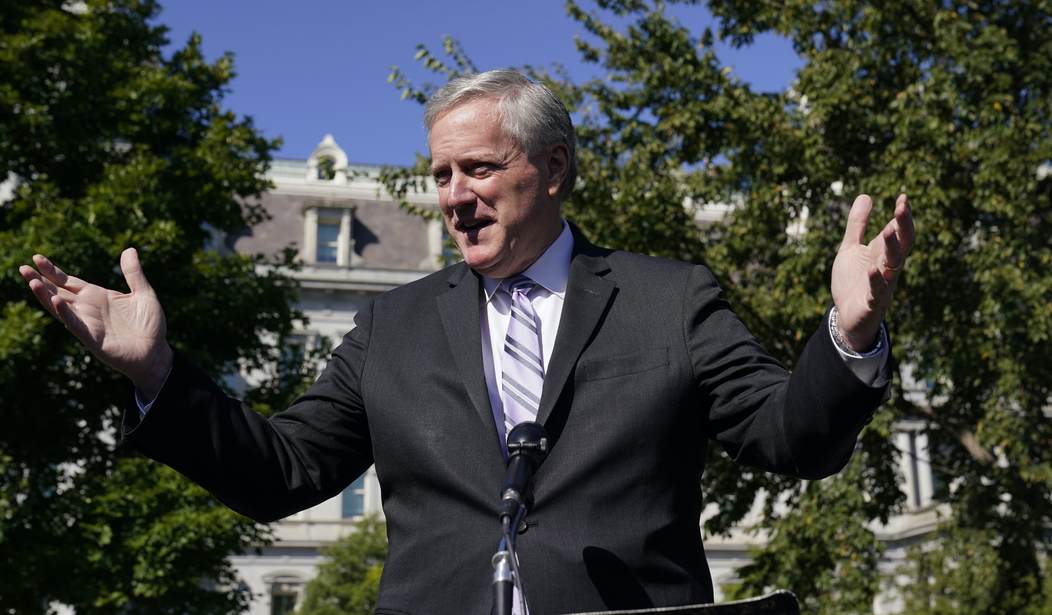Eeeeeenteresting, if true, but likely far less than it seems at first blush. Mark Meadows, who served as Donald Trump’s chief of staff and wingman during the election and post-election period of his presidency, will reverse his previous opposition and cooperate with the House’s committee investigation into the January 6 riot, CNN reports:
Donald Trump’s former chief of staff Mark Meadows is cooperating with the House select committee investigating the January 6 riot and is providing records and agreeing to appear for an initial interview, CNN exclusively has learned.
The move represents a critical shift in the relationship between the top Trump ally and the panel, and staving off a criminal contempt referral for now.
What changed? The House finally forced an indictment of Stephen Bannon a couple of weeks ago, which Bannon has pledged to fight on the basis of executive privilege. Is that what led Meadows to become more cooperative eighteen days later, or did the committee agree to limit their inquiries to areas not currently in dispute over privilege exercises? It might have been a little of both. Committee chair Bennie Thompson (D-MS) suggests that the two sides have temporarily agreed to disagree for now:
“Mr. Meadows has been engaging with the Select Committee through his attorney,” Democratic Rep. Bennie Thompson of Mississippi who chairs the committee said in a statement. “He has produced records to the committee and will soon appear for an initial deposition. The Select Committee expects all witnesses, including Mr. Meadows, to provide all information requested and that the Select Committee is lawfully entitled to receive. The Committee will continue to assess his degree of compliance with our subpoena after the deposition.”
That sounds like less of a “critical shift” on Meadows’ part and more of a compromise approach by both sides. Meadows won’t go the full Bannon by refusing to even appear — likely a tactical and legal mistake, as opposed to appearing and invoking the privilege claimed by Trump to the pertinent questions. But Meadows apparently has forced the committee to take what it can get for the moment, get Meadows’ refusals into the record, and proceed from that point forward.
Meadows’ attorney gave a statement to CNN that largely tracks with that impression:
“As we have from the beginning, we continue to work with the Select Committee and its staff to see if we can reach an accommodation that does not require Mr. Meadows to waive Executive Privilege or to forfeit the long-standing position that senior White House aides cannot be compelled to testify before Congress,” Terwilliger said. “We appreciate the Select Committee’s openness to receiving voluntary responses on non-privileged topics.”
In other words, Meadows might have plenty to say, but the committee might not find it terribly interesting or compelling when he talks selectively. Meadows plans to cooperate enough to forestall legal action, it seems, and that’s about it. An upcoming effort to get an indictment for another Trump adviser might have factored into Meadows’ thinking in that regard:
Hoyer says the full House will act on the criminal contempt referral for former Trump DOJ official Jeffrey Clark this week. Also says House will pass the stop-gap resolution to fund the government on Wednesday, 48 hours before shutdown deadline. Senate would need to act after
— Manu Raju (@mkraju) November 30, 2021
House committees do have the authority to compel appearances in hearings and depositions. Outright refusal to comply is a risky legal strategy, especially when the Department of Justice is run by the same party as the House majority. That’s how Eric Holder got away with defying Republican-led investigations into Operation Fast and Furious, because Holder himself ran the DoJ at that point. Contempt citations by the House are legally meaningless without an indictment by a federal grand jury and prosecution by the DoJ, but they get pretty meaningful under those circumstances. Meadows apparently takes that seriously, even if Bannon and Clark are willing to risk it.
Until Trump runs out the string on privilege, though, Meadows will likely remain firm in limiting his answers to the agreement today. Trump’s attorneys went to the DC Circuit court of appeals today to reverse an earlier judgment that privilege no longer applies, but it sounds as though it didn’t go well for them:
A three-judge panel of the U.S. Court of Appeals for the D.C. Circuit expressed skepticism about the role of the courts in settling disputes between a former president and the sitting president over the release of White House records.
“Who decides when it’s in the best interest of the United States to disclose presidential records? Is it the current occupant of the White House or the former?” Judge Ketanji Brown Jackson pressed Trump’s attorney.
When else in history, the judge asked, has a former president had the “final say”?
Judge Patricia A. Millett also noted that past Supreme Court decisions give more deference to the determinations of the sitting president.
“We have one president at a time under our Constitution,” Millett said.
There is very little chance that the courts will rule that executive privilege survives the president’s term in office. The privilege is attached to the exercise of authority in office, not after it, and Congress has a constitutional oversight authority that is even more explicit in probing the riot on its own grounds. The only valid authority for invoking executive privilege is the current president, and Joe Biden has already broken with tradition in refusing to honor Trump’s request. Courts might see this differently, but it’s a legal long shot at best.
One way or the other, Meadows will end up answering those questions. So will Bannon and Clark, unless they want to go to jail for contempt. Or unless they can run out the string for another year, and hope that an incoming Republican majority in the House drops the whole matter.









Join the conversation as a VIP Member